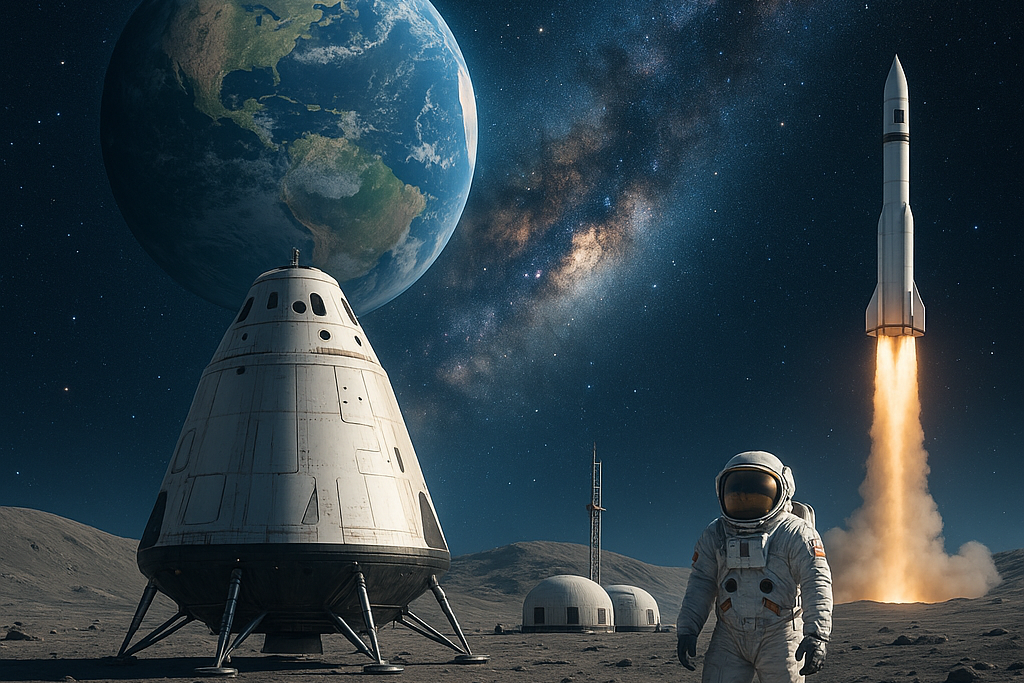As we journey deeper into the 21st century, space exploration is undergoing a major shift. With rapid advances in technology, growing global partnerships, and the rise of private space ventures, we’re heading into an exciting new chapter of discovery.

By the year 2050, we’re likely to witness some truly remarkable breakthroughs. Here’s a sneak peek at what the future might hold:
1. Permanent Moon Bases
Between 2035 and 2040, NASA, ESA, and other space agencies are working toward building permanent, livable habitats on the Moon. These lunar bases won’t just be about setting foot on the surface—they’ll support cutting-edge research, tap into valuable resources, and act as a vital testing ground for future missions to Mars. At the heart of this effort is NASA’s Artemis program, which is already paving the way for this bold vision.
2. Human Mission to Mars
Between 2035 and 2045, we could see something truly historic—a human mission to Mars. SpaceX, NASA, and global space partners are hard at work developing the technology and life-support systems needed to make this ambitious journey possible. If they succeed, it won’t just be a big step—it’ll be a giant leap for human space exploration, opening the door to an entirely new era of interplanetary travel.
(Nasa Mars Mission)
3. Space Tourism Boom
By 2050, space tourism could be a multi-billion-dollar industry—and honestly, it’s not as far-fetched as it sounds. Companies like Blue Origin, SpaceX, and Virgin Galactic are already paving the way with suborbital and orbital flights for civilians.
Fast forward to mid-century, and we might be talking about orbital hotels and even lunar sightseeing trips—first for the wealthy, but eventually for the rest of us. Imagine vacationing on the Moon—how wild would that be?
4. Asteroid Mining and Resource Utilization
By the 2040s, asteroid mining for rare metals and resources could be in full swing—and it might just change everything. Not only could this revolutionize how we acquire resources, but it could also help reduce the environmental toll of traditional mining on Earth.
Companies like Planetary Resources and Deep Space Industries are already exploring these incredible opportunities, and the possibilities are endless. Imagine mining asteroids for metals—we’re truly on the brink of something extraordinary.
5. Deep Space Missions and Interstellar Probes
New propulsion systems—think ion drives, solar sails, and even the possibility of nuclear fusion—could soon make missions to the outer planets and even nearby star systems a reality. Projects like Breakthrough Starshot are pushing the boundaries, aiming to send tiny nanocrafts to Alpha Centauri within this century.
It’s crazy to think that interstellar travel could be in our near future.
6. Artificial Intelligence in Space Exploration
AI is set to be a game-changer in space exploration, especially when it comes to navigation, data analysis, and making autonomous decisions during missions.
Imagine robots and AI-powered probes exploring some of the most extreme environments in our solar system—like Mars’ lava tubes or the mysterious subsurface ocean of Europa.
These technologies will not only help us go further than ever before but will also unlock secrets of the cosmos we’ve only dreamed of understanding. (NASA AI Research)
7. International Collaboration and Governance
As we venture deeper into space, space law and international cooperation will have to evolve to manage lunar territories, space traffic, and how we share resources. Imagine multinational space agencies or coalitions coming together to ensure that space exploration remains peaceful and fair for everyone. It’s not just about reaching the stars—it’s about doing it in a way that benefits all of humanity. The future of space policy is about to get a whole lot more interesting! (UNOOSA, ESA Policy)
8. The Search for Life Beyond Earth
With groundbreaking telescopes like the James Webb Space Telescope and its future successors, astronomers are on the brink of discovering potentially habitable exoplanets. But that’s not all—missions to icy moons like Europa and Enceladus could soon give us vital clues about life beyond Earth. It’s an exciting time to be a space enthusiast, as we’re about to uncover some of the most mind-blowing mysteries of the universe!
(NASA Europa Clipper, Enceladus Life Finder)
Conclusion
By 2050, space exploration will evolve from a bold adventure into a bustling domain of human activity. As we push farther and deeper into the cosmos, our understanding of the universe—and our place within it—will grow in ways we can’t even fully imagine yet.
The future of space is not just about exploration, it’s about shaping the next chapter of human history.

Hey there! This is my first visit to your blog! We are a collection of volunteers and starting a new project in a community in the same niche. Your blog provided us beneficial information to work on. You have done a wonderful job!
https://www.zoritolerimol.com
Good post
Thank you for your valuable feedback. We look forward to adding more insightful blogs soon.
Thank you
Sandeep
email: sandeep@factsdecode.com